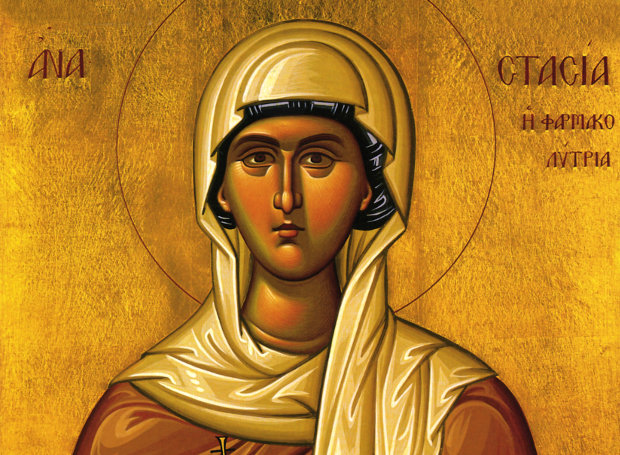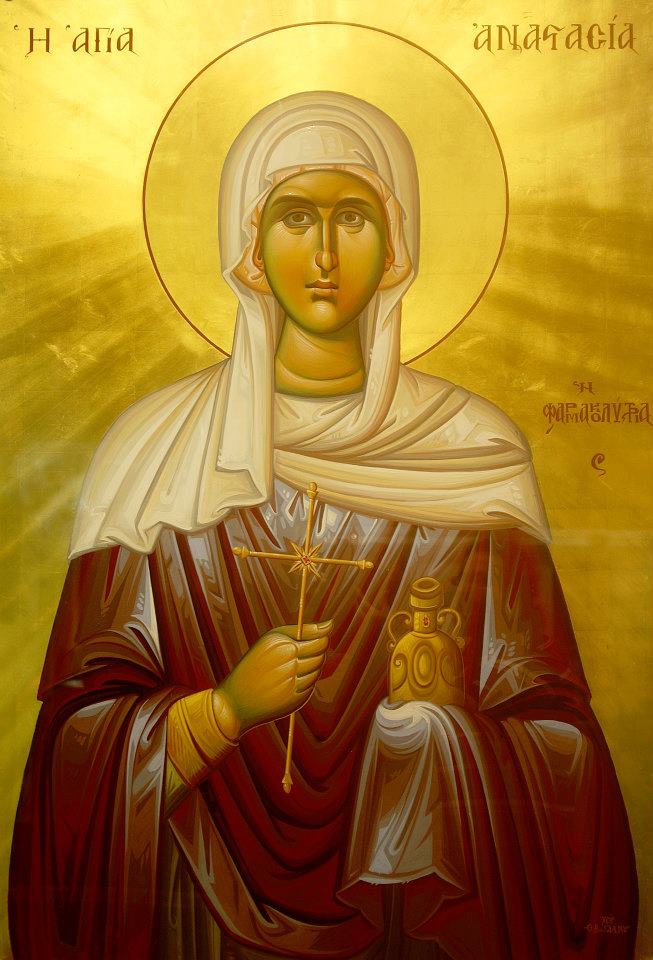Great Martyr Anastasia the Deliverer from Poisons (22 December)


The Great Martyr Anastasía the Deliverer from Poisons, was a Roman by birth, who suffered for Christ during Diocletian’s persecution of Christians, circa 304. Her father was a pagan, and her mother Fausta was a secret Christian. As a child, Anastasia’s teacher was an educated and pious Christian named Chrysógonos. After the death of her mother, Anastasía’s father gave her in marriage to a pagan named Publius, but by feigning illness, she preserved her virginity.
Clothing herself in the garb of a beggar, and accompanied by only one servant, she visited the prisons. She fed, treated, and often ransomed captives who were suffering for their faith in Christ. When her servant told Publius about this, he beat his wife and confined her in his house. Then Anastasía began to correspond secretly with Chrysógonos, who told the Saint to be patient, to cleave to the Cross of Christ, and to accept the Lord’s will. He also foretold the impending death of Publius in the ocean. Publius did drown, as he was setting out for Persia with a delegation. After her husband’s death, Anastasia distributed her property to the poor and suffering.
Diocletian was informed that the Christians who filled the prisons of Rome stoically endured their torments. He commanded that all of them should be put to death in a single night, and that Chrysógonos be sent to him at Aquileia. Anastasía followed her teacher at a distance.
The Emperor interrogated Chrysógonos personally, but could not make him deny Christ. Therefore, he commanded that he be decapitated and thrown into the sea. The Holy Martyr’s body and severed head were carried to shore by the waves. There by Divine Providence, the relics were found by a priest named Zoϊlos, who placed them in a coffer, and concealed them in his home.
Saint Chrysógonos appeared to Zoϊlos and informed him that three sisters who lived nearby, Agápē, Chionia (Χιονὶα), and Irene (April 16), would soon suffer martyrdom for Christ. He told him to send Saint Anastasia to them to encourage them. Saint Chrysógonos foretold that Zoϊlos would also die on the same day. Nine days later, the words of Saint Chrysógonos were fulfilled. Zoϊlos fell asleep in the Lord, and Saint Anastasia visited the three maidens before their tortures. After these three Martyrs surrendered their souls to God, she buried them.
After carrying out her teacher’s request, the Saint went from city to city ministering to Christian prisoners. Proficient in the medical arts of the time, she zealously cared for captives far and wide, healing their wounds and relieving their suffering. Because of her labors, Saint Anastasia was known as the Deliverer from Potions (Pharmakolytria),1 since by her intercessions she has healed many from the effects of potions, poisons, and other harmful substances.
She made the acquaintance of the pious young widow named Theodótē, finding in her a faithful helper. When it was learned that she was a Christian, Theodótē was brought in for questioning. Meanwhile, Saint Anastasia was arrested in Illyricum. This occurred just after all the Christian captives there had been murdered in a single night by Diocletian’s order. Saint Anastasia went to one of the prisons, and finding no one there, she began to weep loudly. The jailers realized that she was a Christian and took her to the prefect of that district, who tried to persuade her to deny Christ by threatening her with torture. After his unsuccessful attempts to persuade Anastasia to offer sacrifice to idols, he handed her over to the pagan priest Ulpian in Rome.


The cunning pagan told Saint Anastasia to choose between luxury and riches, or grievous sufferings. He set before her gold, precious stones and fine clothing, as well as fearsome instruments of torture. The crafty man was put to shame by the bride of Christ. Saint Anastasia refused the riches and chose the tools of torture.
But the Lord prolonged the earthly life of the Saint, and Ulpian gave her three days to reconsider. Charmed by Anastasia’s beauty, the pagan priest decided to defile her. However, when he tried to touch her he suddenly became blind. His head began to ache so severely that he screamed like a madman. He asked to be taken to a pagan temple to pray to the idols for help, but on the way he fell down and died.
Saint Anastasia was set free and she and Theodótē devoted themselves once more to the care of imprisoned Christians. Before long, Saint Theodótē and her three sons received the crown of martyrdom. Her eldest son, Euódos2 stood bravely before the judge and endured his beatings without protest. After much torture, they were all thrown into a red-hot oven.
Saint Anastasia was caught again and condemned to death by starvation. She remained in prison without food for sixty days. Saint Theodótē appeared to the Martyr every night and gave her courage. Seeing that hunger caused Saint Anastasia no harm whatsoever, the judge sentenced her to drowning together with other prisoners. Among them was Eutychianos (Εὐτυχιανὸς), who was condemned for his Christian Faith.
The prisoners were put into a boat which went out into the open sea. The soldiers bored holes in the boat and got into a galley. Saint Theodótē appeared to the captives and steered the ship to shore. When they reached dry land, 120 men believed in Christ and were baptized by Saints Anastasia and Eutychianos. All were captured and received a martyr’s crown. Saint Anastasia was stretched between four pillars and burned alive. A certain pious woman named Apollinaria buried her body, which was unharmed by the fire, in the garden outside her house.
In the fifth century, Saint Anastasia’s relics were transferred to Constantinople, where a church was built and dedicated to her. Later her head and one of her hands were transferred to the Monastery of Saint Anastasia, near Mount Athos.
1 Saint Anastasia’s epithet (Ἡ Ἁγία Ἀναστασία ἡ Φαρμακολύτρια) is derived from the verbs φαρμακεύω and λύω which have the following meanings:
- To administer drugs (in order to heal).
- To poison someone. (Revelation 9:21)
- To practice sorcery or idolatry. (Galatians 5:20, Wisdom 12:4; 18:13, Rev. 18:23) etc.
- To season food.
The second part of her title comes from λύω (to loosen, unbind, loosen from bonds, set free, rescue, release.
2 Pronounced Evódos
This Saint, who was from Rome, was a most comely, wealthy, and virtuous maiden, the daughter of Praepextatus and Fausta. It was her mother who instructed her in the Faith of Christ. The Saint was joined to a man named Publius Patricius, who was prodigal in life and impious in disposition, but she was widowed after a short time. Henceforth, she went about secretly to the dwellings of the poor and the prisons where the Martyrs of Christ were, and brought them whatever was needed for their daily subsistence. She washed their wounds and loosed them from their fetters, and consoled them in their anguish. Also, because the Saint, through her intercessions, has healed many from the ill effects of spells, potions, poisons, and other harmful substances, she has received the name “Deliverer from Potions.” Since the fame of her deeds had spread about, she was arrested by Diocletian’s minions, and after enduring many torments she was put to death by fire in the year 290.
This glorious heroine of the Christian Faith was born in Rome into a wealthy senatorial family of a pagan father and a Christian mother. From her early youth, she clung in love to the Lord Jesus, guided in the teaching of Christ by a devout teacher, Chrysogonus. Anastasia was forced by her father to enter into marriage with a pagan landowner, Publius. Excusing herself on the basis of a female illness, she in no way wished to enter into physical relations with him. For this, her husband tortured her harshly by confinement and starvation. He inflicted even more tortures upon her when he learned of her secret visits to the prisons of the Christian martyrs: bringing them provisions, ministering to them, bathing their wounds and loosening their bonds. But by God’s providence she was freed from her wicked husband. Publius was sent to Persia by the emperor, and while sailing on the sea he was drowned.
St. Anastasia then began to minister freely to the tortured Christian martyrs and to comfort the poor, giving them alms from her great inheritance. At one time the Emperor Diocletian was in the town of Aquileia and ordered that Chrysogonus, the confessor of Christ, be brought to him. St. Anastasia accompanied him on the way. Holy Chrysogonus was beheaded by order of the emperor, and then three sisters–Agape, Chionia and Irene–also suffered (April 16): the first two were cast into fire and the third was shot through with arrows. St. Anastasia took their bodies, wrapped them in white linen, anointed them with many aromatic spices, and honorably buried them. Following this, Anastasia went to Macedonia, where she helped the sufferers for Christ. There she became well known as a Christian, for which she was seized and brought before various judges for interrogation and torture. Desiring to die for her beloved Christ, Anastasia constantly longed for Him in her heart.
A certain chief of the pagan priests, Ulpianus, lustfully tried to touch St. Anastasia’s body, but he was suddenly blinded and breathed his last. Condemned to death by starvation, St. Anastasia lingered in prison for thirty days without food, nourishing herself only on tears and prayer. Then she was placed in a boat with several other Christians to be drowned, but God delivered her even from this death. She was finally tied by the feet and hands to four wheels over a fire, and she gave up her holy soul to God. She suffered and took up her habitation in the Kingdom of Christ in the year 304 A.D.
Apolytikion of Great Martyr Anastasia of Rome
Fourth Tone
O Lord Jesus, unto Thee Thy lamb doth cry with a great voice: O my Bridegroom, Thee I love; and seeking Thee, I now contest, and with Thy baptism am crucified and buried. I suffer for Thy sake, that I may reign with Thee; for Thy sake I die, that I may live in Thee: accept me offered out of longing to Thee as a spotless sacrifice. Lord, save our souls through her intercessions, since Thou art great in mercy.
Kontakion of Great Martyr Anastasia of Rome
Second Tone
When they that are found in trials and adversities flee unto thy church O Anastasia, they receive the august and wondrous gifts of divine grace which doth abide in thee; for at all times, O Saint of God, thou pourest forth streams of healings for the world.
Source: oca.org / goarch.org / westserbdio.org




